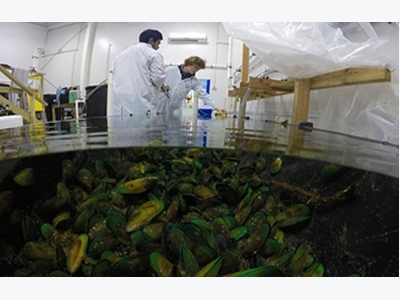Students experiment with mussel aquaculture

A group of nearly 200 biology students donned lab coats and embarked on a trip to New Zealand’s Cawthron Aquaculture Park to participate in a series of mussel biology workshops.
As part of the workshop program, the secondary school students were given access to state-of-the-art Nelson Marlborough Institute of Technology (NMIT) laboratory facilities, and were able to vie for NCEA credits by conducting self-led experiments with mussels. A collaboration between NMIT, SpatNZ, University of Otago and Cawthron Institute, the workshop program has entered its sixth year, but this year is the first with Nelson College participating, said Nelson College science teacher Johnnie Fraser.
"It’s so great for senior biology students to meet scientists in an informal situation to discuss their investigations, and to hear from the scientists the pathways that led them to their work,” said Fraser, who spent six months with Cawthron under a Royal Society placement before advocating that his students become involved in the program, too.
"Connecting the Cawthron science and scientists, with local industry, and the courses available at NMIT and Otago University is a precious thing for high school science students," Fraser added.
So far, Fraser’s students, including Gardhav Mehratra, are enjoying the experience.
"My experiment is off to a sensational start. I’m looking at how a change in the pH of the water affects mussel feeding rate," said Mehratra.
The workshops are a part of Cawthron’s curriculum focused on disseminating science and knowledge in the broad environmental field, said Cawthron community educator Cristina Armstrong.
"The workshops are a valuable learning tool. Students lead their own experiments and for many it’s the first time they have to overcome real science challenges. We survey the students before and after they complete the workshop and the positive results demonstrate the research-teaching nexus,” said Armstrong. "During their time at the Cawthron Aquaculture Park, students have a special visit to SpatNZ’s premises where they discover how the mussel breeding programme works, and learn how New Zealand’s aquaculture value has increased through research and innovation."
The students are supplied with mussel spat by SpatNZ, which notes the industry necessity to develop human capability.
"We support the workshops because we see human capability as a key component of our business. Through the tour of our facilities, students see first-hand that there are cool jobs in the aquaculture industry," said Dan McCall, operations manager for SpatNZ.
Cawthron Foundation partners with regional councils, community groups, universities, schools and science and community educators in the top of the south to deliver outreach activities, it said. Its education programs are aligned with the New Zealand curriculum and are based on current environmental science.
Có thể bạn quan tâm
Phần mềm

Phối trộn thức ăn chăn nuôi

Pha dung dịch thủy canh

Định mức cho tôm ăn

Phối trộn phân bón NPK

Xác định tỷ lệ tôm sống

Chuyển đổi đơn vị phân bón

Xác định công suất sục khí

Chuyển đổi đơn vị tôm

Tính diện tích nhà kính

Tính thể tích ao hồ



 Copper River salmon hits market at record-high prices
Copper River salmon hits market at record-high prices  Australia continues to impose conditions on imported prawns
Australia continues to impose conditions on imported prawns